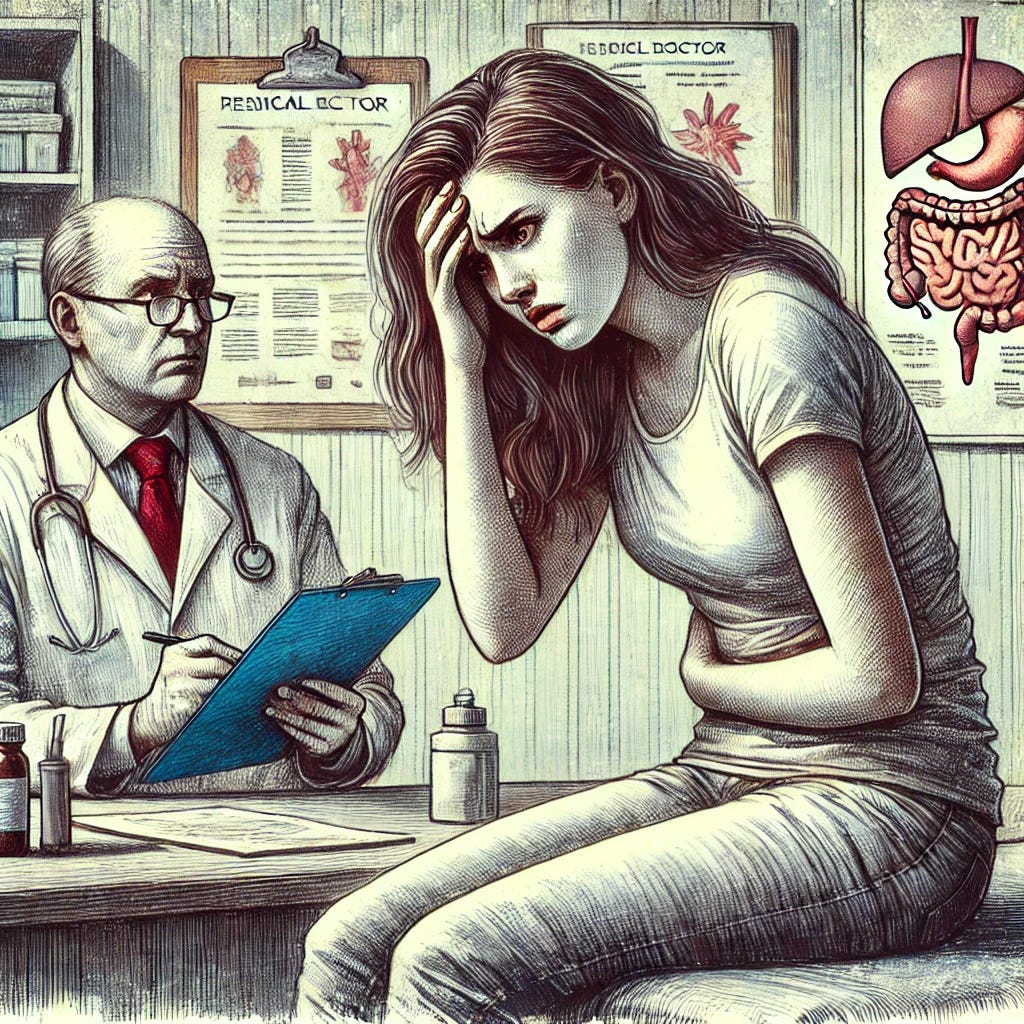Neurodivergent women are dying younger.
They are sicker, more likely to be misdiagnosed, and receive less medical care than their neurotypical peers.
💡 Fact: Autistic women are more likely to develop life-threatening circulatory and metabolic conditions, yet they receive fewer screenings and less treatment than neurotypical women.
Doctors are failing them—and it’s costing lives.
🚨 Chronic Illness in Neurodivergent Women: The Medical System is Ignoring the Warning Signs
Despite overwhelming evidence, the healthcare system continues to dismiss neurodivergent women’s symptoms as "just anxiety" or "stress-related."
But research shows they are at significantly higher risk for serious physical health conditions, including:
🔹 Circulatory disorders (POTS, Raynaud’s, hypertension)
🔹 Autoimmune diseases (thyroid disorders, inflammatory bowel disease)
🔹 Chronic pain syndromes (fibromyalgia, migraines, hypermobility syndromes)
🔹 Metabolic conditions (diabetes, hormonal imbalances)
🔹 Sleep disorders (insomnia, hypersomnia, circadian rhythm disruptions)
🚨 Yet most doctors don’t even check for these conditions in neurodivergent patients.
Instead, women are sent home with misdiagnoses like anxiety, depression, or "stress-related issues."
💡 Fact: 77% of neurodivergent women experience chronic pain, yet they are often dismissed or undertreated.
🚨 Medical Gaslighting: When Doctors Refuse to Listen
This isn’t just frustrating—it’s dangerous.
It means actual medical conditions go untreated for years, even decades. Women are left suffering from chronic pain, worsening conditions, and preventable deaths.
🚨 How Medical Gaslighting Harms Neurodivergent Women:
🛑 Their pain is ignored.
🛑 Their symptoms are blamed on stress or mental health.
🛑 They’re sent home with antidepressants instead of real answers.
💡 Fact: Autistic women have higher mortality rates than both autistic men and neurotypical women, largely due to misdiagnosis and lack of treatment.
Common Gaslighting Phrases Neurodivergent Women Hear:
❌ "You’re just anxious."
❌ "It’s probably stress—try to relax."
❌ "Your test results are normal, so there’s nothing wrong."
❌ "Maybe you just need to lose weight or change your diet."
🙅🏽♀️ Reality Check: These aren’t “just stress.” These are signs of serious medical conditions—but most doctors aren’t trained to recognize them.
🚨 The Real Problem: No Cross-Screening, No Proper Diagnosis
Neurodivergent women are being sent on a medical scavenger hunt.
🛑 Neurologists for migraines.
🛑 Cardiologists for dizziness.
🛑 Gastroenterologists for stomach pain.
🚨 But no one connects the dots.
Instead of recognizing that neurodivergent women are at higher risk for multiple co-occurring conditions, the system treats symptoms in isolation.
🚨 No Cross-Screening = Missed Diagnoses
❌ Neurodivergent women are rarely screened for conditions like POTS, hypermobility, or endocrine disorders—despite being at higher risk.
❌ Instead of addressing the root cause, they are often misdiagnosed with anxiety, depression, or conversion disorder.
❌ As a result, many go for decades without proper treatment.
💡 Fact: Autistic women face a significantly higher risk of osteoporosis and fractures, yet most are never screened for bone density issues.
🚨 Why Are Neurodivergent Women Being Overlooked?
❌ Outdated Stereotypes – Many doctors still associate autism with young boys and ADHD with hyperactive kids. They ignore how these conditions present in women.
❌ Masking & Communication Differences – Neurodivergent women often mask their distress, making doctors assume they’re "fine" when they’re actually in severe pain.
❌ “Too Young to Be Sick” Bias – Many doctors dismiss symptoms because the patient is young, even when research shows these health conditions start early in neurodivergent individuals.
❌ Fragmented Care Model – Patients are sent to multiple specialists who don’t communicate with each other, leading to years of misdiagnosis and inadequate treatment.
💡 Fact: Autistic women have a 24.8x higher risk of hip fractures than neurotypical women, yet most doctors don’t even consider screening them for osteoporosis.
🚨 What Needs to Change?
It’s time for the medical community to catch up with the research.
🔹 Routine screening for common co-occurring conditions (e.g., POTS, hypermobility, metabolic disorders) in neurodivergent patients.
🔹 A shift away from fragmented care toward a whole-body approach.
🔹 More research on the overlap between neurodivergence and chronic health conditions—especially in women.
🔹 Medical professionals must be trained to recognize medical issues in neurodivergent patients instead of dismissing them as mental health concerns.
🚨 A Call for Change: Speak Up & Demand Better Care
📢 Doctors need to stop dismissing neurodivergent women’s health concerns as “just anxiety.”
📢 We need more research, better screening, and real medical care—not gaslighting.
📢 This is a crisis. We cannot wait for the medical system to catch up.
💡 The change starts with us. Share this. Speak out. Demand better. Because neurodivergent women deserve better.
Learn more
Kelly, C., Martin, R., Taylor, R., & Doherty, M. (2024). Recognising and responding to physical and mental health issues in neurodivergent girls and women. British Journal of Hospital Medicine. https://doi.org/10.12968/hmed.2023.0337
📢 Have you experienced medical gaslighting or doctors dismissing your symptoms? What has helped you advocate for yourself? Let’s talk in the comments!
I run ADHD support groups for women and am in the process of making the 30 courses and workbooks available from that group. I also run therapy practice of 30 years.
I am also in the process of ( trying) to develop a free, affirming community where neurodivergent women can connect.
Kristen McClure MSW, LCSW






Thank you this. And it is true. I have to fight just to have blood work done for my thyroid some times. I feel like a hypochondriac. I have even told my doctor this. I feel I am yelling into an empty well.
This is me 💯